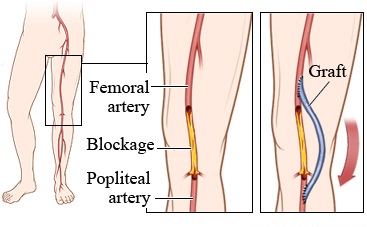Femoro Popliteal Bypass
India
-
Our Price USD 3060
-
Hospital Price USD 3400
-
You Save : USD 340
Booking Amount: USD 306. Pay Remaining 90% at the hospital.
Book NowAdditional Credit
Among the important extras we offer as part of the Additional Credit are the following:
-
Site Tourism For The Patient & Attendant
-
Airport Pick & Drop Service
-
Ambulance service at airport
-
Priority appointments with The Doctor
-
Cancel Easily Anytime with Full Refund
-
Room Upgradation
-
Free Online Doctor Consultation Valued at USD 20
-
Free hotel Stay for 5 to 7 days Accordingly
-
Welcome Kit at Arrival
-
Interpreter
-
Medical Visa Assistance
What is Included?
- Doctor consultation charges
- Lab tests and diagnostic charges
- Room charges inside hospital during the procedure
- Surgeon Fee
- Cost of implant
- Nursing charges
- Hospital surgery suite charges
- Anesthesia charges
- Routine medicines and routine consumables (bandages, dressings etc.)
- Food and Beverages inside hospital stay for patient and one attendant.
What is not Included?
- Extra Radiology Investigations
- Healthcare Professionals Charges of other consultations.
- Other Requested Services such as Laundry etc.
- Additional Pharmaceutical Products and Medicines After Discharge from Hospital.
- Management of Conditions Unrelated to Procedures or Pre-Existing.
- The cost of any additional implants will be in addition to the package cost.
Package Description
Femoro Popliteal Bypass:
Femoral popliteal bypass surgery (also known as femoropopliteal or Fem-Pop) is a method for treating femoral artery disease. It is done to use a segment of another blood vessel to bypass a blocked part of the major artery in the leg.
The femoral artery is accessed by a major incision in the upper leg by the healthcare professional. Above and below the obstruction, a vein from another part of your leg is joined. A graft is the term for this procedure. The blood is diverted around the obstruction through the transplant.
Disease Overview:
Blocked femoral artery
When the femoral artery narrows or becomes completely blocked, it can induce claudication, tiredness, and severe cramping in the calf muscles. A blocked artery in your leg might result in the amputation (removal) of your toes, foot, or limb in extreme cases.
Disease Signs and Symptoms
- After certain activities, such as walking or ascending stairs, you may have painful cramping in one or both hips, thighs, or calf muscles.
- Numbness or weakness in the legs.
- Coldness in your lower leg or foot, particularly on one side compared to the other.
- Sores that won't heal on your toes, foot, or legs.
Disease Causes:
Factors that are at risk
- Smoking.
- Diabetes.
- Obesity is a problem that affects many people (a body mass index over 30)
- Blood pressure that is too high.
- Cholesterol levels are high.
- Increasing age, especially after 65 or 50 if you have atherosclerosis risk factors.
- Peripheral artery disease, heart disease, or stroke in the family.
Disease Diagnosis:
The following are some of the tests your doctor may use to detect peripheral artery disease:
Examination of the body. A weak or absent pulse below a narrowed area of your artery, whooshing sounds over your arteries that can be heard with a stethoscope, evidence of poor wound healing in the area where your blood flow is restricted, and decreased blood pressure in your affected limb are all signs of PAD that your doctor may find during a physical exam.
Ankle-brachial index is a measurement of the distance between the ankle and the wrist (ABI). This is a frequent test for detecting PAD. The blood pressure in your ankle is compared to the blood pressure in your arm.
Your doctor will take your blood pressure using a standard blood pressure cuff and a specific ultrasound instrument to assess blood pressure and flow.
To capture the severity of the restricted arteries when walking, you can walk on a treadmill and have readings taken before and after you exercise.
Ultrasound. Doppler ultrasound and other special ultrasound imaging techniques can assist your doctor assess blood flow through your blood vessels and locate blocked or constricted arteries.
Angiography. This test lets your doctor to see blood flow through your arteries as it happens by injecting a dye into your blood vessels. Your doctor can use imaging techniques including X-rays, magnetic resonance angiography (MRA), or computed tomography angiography to track the dye's passage.
Catheter angiography is an invasive treatment that includes inserting a short hollow tube (catheter) into a groyne artery and infusing dye into the afflicted region. This sort of angiography helps your doctor to diagnose and repair a clogged blood artery right away. Your doctor can enlarge a restricted blood artery by inserting and inflating a small balloon or by delivering medicine that enhances blood flow after locating the narrowed location.
Tests on the blood. A blood sample can be used to screen for diabetes and assess cholesterol and triglycerides.
Disease Treatment:
Peripheral artery disease treatment has two primary goals:
Manage symptoms like leg discomfort so you can go back to doing things you like.
Reduce your risk of heart attack and stroke by slowing the growth of atherosclerosis throughout your body.
You might be able to achieve these goals by making lifestyle modifications, especially if you're dealing with peripheral artery disease early on. Quitting smoking is the single most essential thing you can do to lower your risk of problems if you smoke. Walking or practising other forms of exercise on a regular basis, as part of supervised exercise instruction, can significantly improve your symptoms.
You will almost certainly require extra medical care if you have signs or symptoms of peripheral artery disease. Preventing blood clots, lowering blood pressure and cholesterol, and controlling pain and other symptoms are all things your doctor may recommend.
In some circumstances, angioplasty or surgery may be required to treat claudication caused by peripheral arterial disease:
Angioplasty. A catheter is passed into a blood vessel to the afflicted artery in this treatment. A tiny balloon on the catheter's tip is inflated to flatten the plaque against the arterial wall and reopen the artery while stretching it open to improve blood flow.
A mesh tube (stent) may be inserted into the artery by your doctor to assist keep it open. This is the same process that surgeons use to unblock blocked arteries in the heart.
Bypass surgery is a procedure that involves the removal of a portion Your doctor may use a blood vessel from another area of your body or a synthetic vessel to build a passage around the blocked artery. Blood is able to bypass the blocked or constricted artery with this approach.
Bypass surgery is a procedure that involves the removal of a portion Your doctor may use a blood vessel from another area of your body or a synthetic vessel to build a passage around the blocked artery. Blood is able to bypass the blocked or constricted artery with this approach.
Thrombolytic therapy is a treatment that prevents blood clots from forming Your doctor may inject a clot-dissolving medicine into your artery at the spot of the clot to break it up if you have a blood clot obstructing an artery.
Information related to Treatment
Package Details
Days in Hospital
7 Days
Days in Hotel
*
14 Days
Room Type
Private
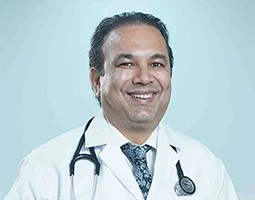
Treating Doctor
Dr. Umesh Kohli
Interventional Cardiologist- Echocardiography, Pacemaker Implantation, Coronary Angiography, Coronary Angiogram, Cardiac Ablation, Cardiac Catheterisation, ASD VSD repair, Cardioversion, Implantable Cardioverter-Defibrillators (ICDS), Peripheral Angioplasty, Non Invasive Cardiology, Chest Pain Treatment, Bypass Surgery, CT angiogram, Cardiology, Balloon Mitral Valbuloplasty
Accord Super specialty Hospital Faridabad, India
24 Years of Experience
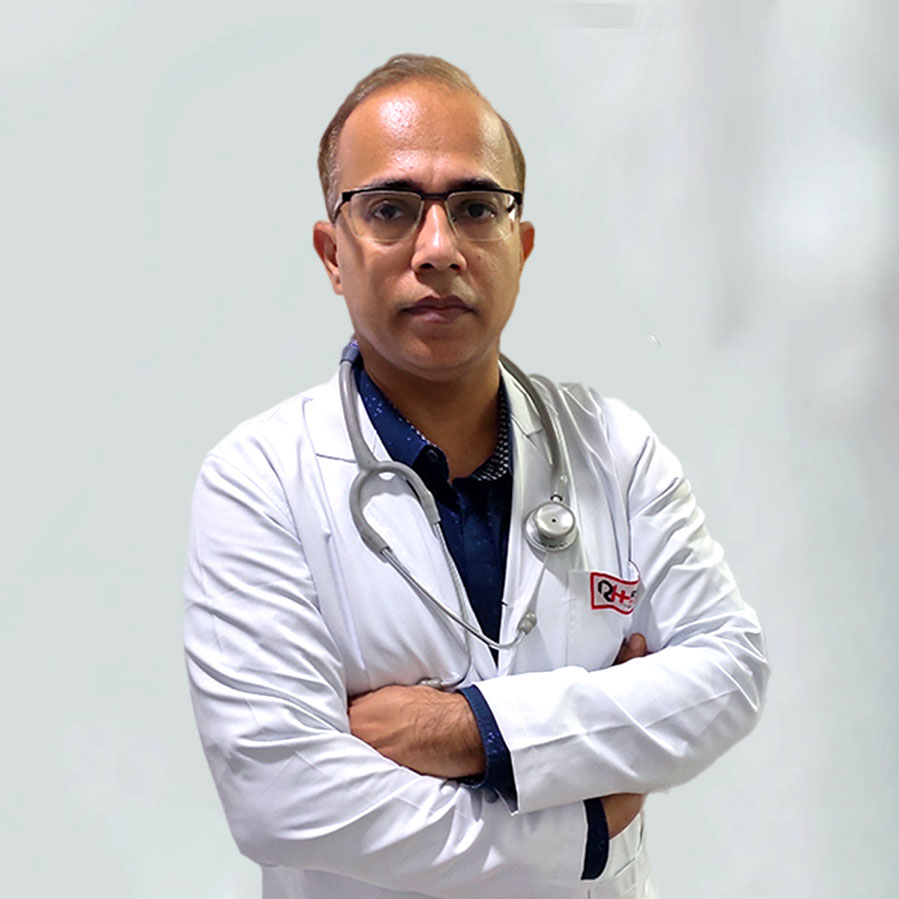
Treating Doctor
Dr. Sumit Narang
Cardiothoracic and Vascular Surgeon- Heart Failure Treatment, LVAD, Tricuspid, CABG on beating heart, Aortic Aneurysm Surgery, Double Valve Replacement, MVR, AVR, Peripheral & Carotid angioplasty and Stenting, TAVI/TAVR, PDA & ASD closures, VSD, Adult Valvuloplasty (mitral etc.)
Marengo Asia hospital, Faridabad Faridabad, India
26 Years of Experience
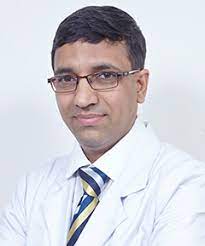
Treating Doctor
Dr Vineet Bhatia
Cardiologist- Pacemaker Implantation, Coronary Angiography, Coronary Angioplasty / Bypass Surgery, Cardiac Catheterisation, Pacemaker Implantation, Balloon Valvuloplasty, AICD Implantation, EPS, Optical Coherence Tomography, RFA, Pacemaker Implantation, Cardiac Catheterisation, Pacemaker Implantation, Pacemaker Implantation, Cardiac Catheterisation
Fortis Hospital Noida Noida, India
23 Years of Experience
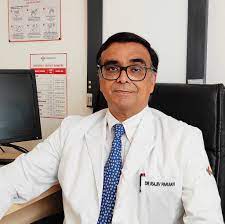
Treating Doctor
Dr. Rajiv Parakh
Vascular surgeon- Carotid Surgery, Endovascular Interventions
Medanta-The Medicity, Gurgaon Gurgaon, India
35 Years of Experience
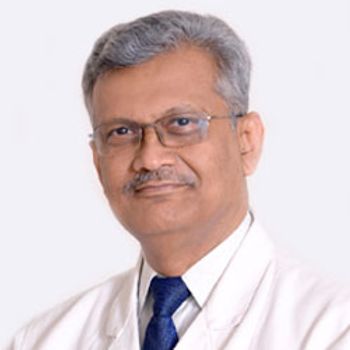
Treating Doctor
Dr Adarsh Koppula
Cardiac Surgeon- CABG on beating heart, CABG on beating heart, Valve replacement / repair, Blood Conversation in Cardiac Surgery
Max Super Speciality Hospital New Delhi, India
37 Years of Experience
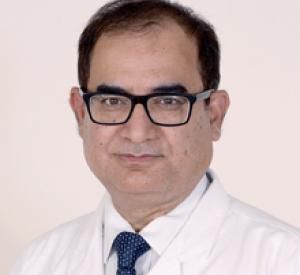
Treating Doctor
Dr Rajnees Malhotra
Cardiac Surgeon- Left ventricular assist device (LVAD), Coronary artery bypass graft (CABG) surgery, Heart transplant, Heart Failure Treatment, Minimally invasive Cardiac Surgery, Heart transplant, Extra Corporeal Membrane Oxygenation-ECMO, Robotic Cardiac Surgery, Mitral Valve Replacement & Repairs, Atrial Septal Defects (ASDS), Aortic Valve Replacement & Repairs
Max Super Speciality Hospital New Delhi, India
31 Years of Experience

Treating Doctor
Dr Kumud Rai
Vascular surgeon- Aortic Aneurysm Surgery, Congenital Heart Disorder CHD, Correction of Varicose Veins, Aneurysmectomy and Peripheral Bypass Surgery
MAX Super Speciality hospital, Patpadganj Delhi New Delhi, India
29 Years of Experience
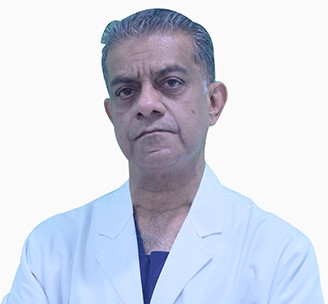
Treating Doctor
Dr. S. Radha Krishnan
Interventional Cardiologist- Pacemaker Implantation, Transcatheter Aortic Valve Implantation (TAVI), Coronary Angiography, Cardiac Ablation, Cardiac Catheterisation, Aortic Anuerysm Surgery/ Endovascular Repair, Cardioversion, Carotid Angioplasty And Stenting, Implantable Cardioverter-Defibrillators (ICDS), Pacemaker Implantation, Peripheral Angioplasty, PCI, TMT, TOF, PDA, DGTA, Pacemaker Implantation, Cardiac Catheterisation, Carotid Angioplasty And Stenting, Pacemaker Implantation, Peripheral Angioplasty, Cardiac Ablation, Cardioversion, Pacemaker Implantation, Cardiac Catheterisation
Fortis Escorts Heart Institute New Delhi, India
40 Years of Experience
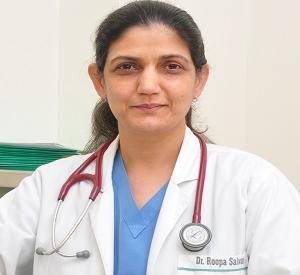
Treating Doctor
Dr Roopa Salwan
Cardiologist- Echocardiography, Left ventricular assist device (LVAD), Coronary artery bypass graft (CABG) surgery, Pacemaker Implantation, Coronary Angiography, Bypass Heart Surgeon, Epilepsy Disorder, Cerebral Palsy Surgeon, Balloon Angioplasty, Mitral valve replacement, Cardiac Ablation, Congenital Heart Disorder CHD, Carotid Angioplasty And Stenting, Pacemaker Implantation, Hypertension Treatment, ICD implantation, Mycardial Infarction, Prevention of Blockage, Atherosclerosis & Heart At, Holistic Heart Wellness & Health Care - Ayurveda, Preventing Post Bypass Surgery Blockages, Preventing Restenosis, Stent Surgery, PTCA or Coronary Angioplasty, Myocarditis Treatment, Atrial fibrillation treatment, Mitral insufficiency treatment, Hypertrophic cardiomyopathy treatment, Ventricular tachycardia treatment, Cardiac catheterizations, Hip Disorders, Pacemaker Implantation, Echocardiography, Hypertension Treatment, Echocardiography, Carotid Angioplasty And Stenting, Pacemaker Implantation, Cardiac Ablation, Pacemaker Implantation
Max Super Speciality Hospital New Delhi, India
32 Years of Experience
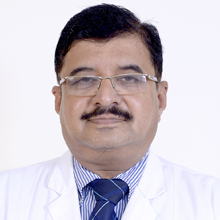
Treating Doctor
Dr Kumud rai
Vascular surgeon- Aortic Aneurysm Surgery, Congenital Heart Disorder CHD, Correction of Varicose Veins, Aneurysmectomy and Peripheral Bypass Surgery
Max Super Speciality Hospital New Delhi, India
29 Years of Experience

